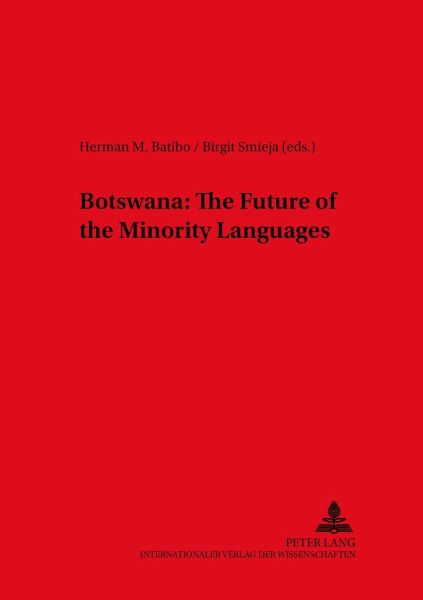
Botswana: The Future of the Minority Languages
Versandkostenfrei!
Versandfertig in 6-10 Tagen
72,95 €
inkl. MwSt.

PAYBACK Punkte
0 °P sammeln!
The need of the national language Setswana to participate actively in society, politics and democratisation as both national language and lingua franca of Botswana, has caused language domination and suffocation on the part of the 25 or so minority languages. As a result, these languages are now going through a process of language shift and death. Consequently, their cultures, too, suffer great losses in order to keep pace with the mainstream society.The aim of the book is threefold: (a) to inform the large public, both local and international, about the sociolinguistic and related issues rega...
The need of the national language Setswana to participate actively in society, politics and democratisation as both national language and lingua franca of Botswana, has caused language domination and suffocation on the part of the 25 or so minority languages. As a result, these languages are now going through a process of language shift and death. Consequently, their cultures, too, suffer great losses in order to keep pace with the mainstream society.
The aim of the book is threefold: (a) to inform the large public, both local and international, about the sociolinguistic and related issues regarding the minority languages of Botswana, (b) to provide facts about the state and future trends of the minority languages in order to sensitise the public and the relevant authorities about the issues involved, and (c) to present ideas and insights in order to stimulate academic debates on the minority languages.
Linguists from Botswana as well as from Europe and U.S.A. present their latest field research findings to shed light on the present situation of the minority languages.
The aim of the book is threefold: (a) to inform the large public, both local and international, about the sociolinguistic and related issues regarding the minority languages of Botswana, (b) to provide facts about the state and future trends of the minority languages in order to sensitise the public and the relevant authorities about the issues involved, and (c) to present ideas and insights in order to stimulate academic debates on the minority languages.
Linguists from Botswana as well as from Europe and U.S.A. present their latest field research findings to shed light on the present situation of the minority languages.












